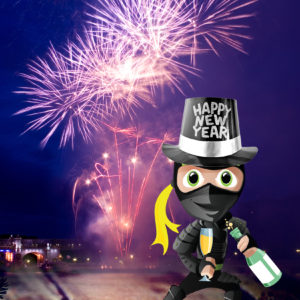Questions for a Language Ninja: Does Being “Turnt” Require Antibiotics?
The Language Ninja explains the meanings of a newfangled millennial slang term.
Welcome to the final Language Ninja column for the year 2016, which – and I’m sure many of you will agree – will certainly be regarded as one of the top 20 worst years in the history of humankind. (We lost David Bowie in January, which was the first sign that 2016 was going to be a nightmare.) Nevertheless, it has been a fascinating year for English usage. We’ve seen several terms – both invented and re-discovered – that will likely enter the American English lexicon, bigly. Now, let’s try to muster up some seasonal cheer, drink copious amounts of eggnog, and perform a deep-dive into contemporary linguistic issues. Seriously – this column is going to be yuuuge.
which was the first sign that 2016 was going to be a nightmare.) Nevertheless, it has been a fascinating year for English usage. We’ve seen several terms – both invented and re-discovered – that will likely enter the American English lexicon, bigly. Now, let’s try to muster up some seasonal cheer, drink copious amounts of eggnog, and perform a deep-dive into contemporary linguistic issues. Seriously – this column is going to be yuuuge.
Q: I can’t understand millennial slang. Is “turnt” a word?
A: Turnt: Adjective. 1. A feeling of intense excitement or anticipation, likely preceding a party or other high-energy event. 2. The sensation of sexual excitement. 3. The state of intoxication, resulting from the use of alcohol and/or narcotics. 4. Pretty much anything cool. (We don’t have to be too precise; this won’t be on the SATs for at least another 75 years.)
“Man, the Inland Empire Philharmonic is throwing down some Bach Goldberg Variations and it’s gonna be turnt!”
While “turnt” is a slang term whose definition and appropriate usage cannot necessarily be automatically gleaned from the word from which it originated, there is a logic behind its evolution.
Anecdotally, “turnt” was born from the expression “turned up” – itself a likely iteration of the late 1980s and 90s rallying cry to “turn up the volume”. Basically, it started as a music-related party expression, and it has been abbreviated and massaged into an effective declaration of excitement. Of course, the phrase “turned on”, meaning physical arousal, was probably also progenitor of the expression. Although the exact source of its introduction into (relatively) common usage can’t be precisely determined, we might have Kanye West to thank for it. (As we do for so much unfortunate cultural phenomena.)
So, to answer your original question (which the Ninja had to go back and re-read, since she seems to have gone off on a tangent), is yes, “turnt” is a word. It is, for the moment, a slang term, but it is a word, in the sense that it is used and understood as being a part of the English language, however peripheral.
Before we get all high-and-mighty over young people and their slang, (consarnit!) let’s remember that the Great literary God William Shakespeare himself wasn’t averse to using the slang terms of his day – in fact, it’s very likely that many (if not most) of the words Shakespeare is credited with having invented, were just words being tossed around anyway. Some caught on. (Swagger! Obscene!) Many did not. (Swoltery! Kickie-wickie!) And let’s face it: “turnt” is a much more efficient slang term than “fancy-monger” or “miching”.
That’s all for this edition. The Language Ninja wishes all of you a turnt New Year!
Holly Troupe is a professional web content writer and an amateur everything else. She spends her days writing, eating, and looking for ways to incorporate the term “perfidy” into the urban vernacular.

